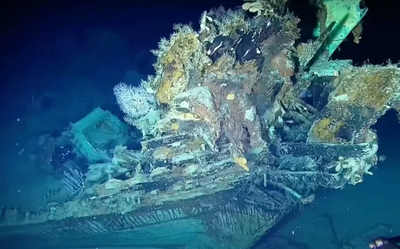Sunken Treasure Sparks International Dispute: Indigenous Groups Demand Share in Spanish Galleon's Bounty
In a twist of fate that echoes the colonial past, members of three South American indigenous communities are staking their claim to a share of the treasure from a Spanish galleon that sank off the coast of Colombia 300 years ago.
The San Jose, believed to be carrying one of the largest unsalvaged collections of maritime treasures, met its watery grave in 1708 near the port of Cartagena.
The Killakas, Carangas, and Chichas peoples argue that their ancestors, often working under slave-like conditions, extracted the metals that make up around half of the ship's cargo from mines in what is now Bolivia. They have petitioned Spain and UNESCO to declare the galleon as "common and shared heritage," ensuring that they too benefit from any proceeds of the ship's recovery.
"Our native communities consider any act of intervention and unilateral appropriation of the galleon, without consulting us directly and without expressly and effectively considering its common and shared character, to be an act of plunder and neo-colonialism," the indigenous communities stated in letters sent to UNESCO and Spain.
The galleon's precious cargo, including gold, silver, and emeralds, was destined for Spain during the War of the Spanish Succession. However, a fierce battle with a British fleet sealed the San Jose's fate, sending it to the bottom of the Caribbean Sea near the port of Cartagena. The lives of some 600 crew members were lost, and with them, the immense treasure sank into the depths.
For centuries, the San Jose galleon remained a mystery, its exact location unknown. It wasn't until 2015 that sonar images revealed the wreckage, along with tantalizing glimpses of bronze cannons, arms, ceramics, and other artifacts scattered across the seabed. The discovery reignited interest in the galleon's story and the potential riches that lay beneath the waves
Colombia announced plans in February to launch an underwater exploration mission to recover the galleon, but the indigenous communities fear that current Colombian law favors treasure hunters over their rightful claims.
Lawyer Jose Maria Lancho, representing the indigenous communities, warns that if Spain renounces its claim on the ship and its contents in Bogota's favor, it could set a dangerous precedent for other sunken ships from the colonial era and their bounties.
The case has drawn international attention, with UNESCO confirming receipt of the indigenous communities' petition. However, the agency's spokesperson noted that Colombia, unlike Spain, has not signed the 2001 Convention on the Protection of Underwater Cultural Heritage, limiting UNESCO's scope of action in this particular case.
As the battle for the San Jose's treasure unfolds, it serves as a stark reminder of the complex legacy of colonialism and the ongoing struggle for justice and recognition by indigenous communities. The outcome of this dispute could have far-reaching implications for the future of underwater cultural heritage and the rights of those whose ancestors played a crucial role in its creation.






